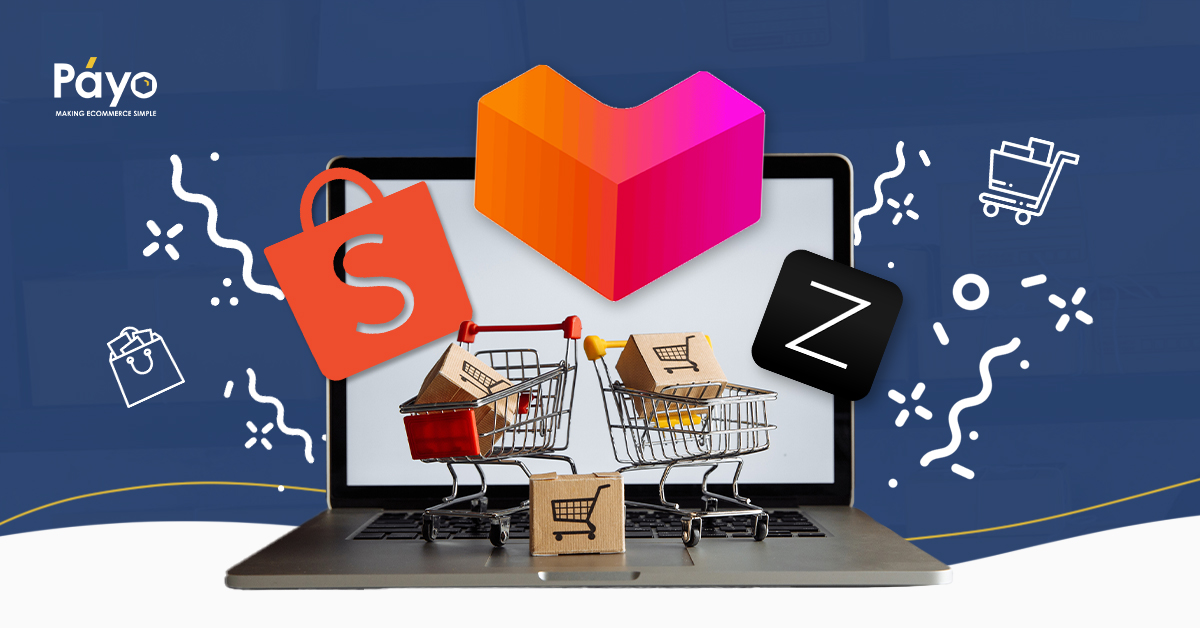

5 best E-commerce marketplaces in the Philippines
From what was once a niche service, E-commerce and online marketplaces have become a huge part of the everyday lives of most Filipinos. With how simple and hassle-free shopping online can be, it’s no surprise that E-commerce has grown into a nearly 270 billion peso industry. This has resulted in a considerable number of online marketplaces popping up and vying for everyone’s attention.
For merchants, all these options can make it challenging to find the right online marketplace for their business. Don’t worry, we’re here to help you cut through the noise!
We went through a number of popular online marketplaces and took a closer look at them – understanding their pros, cons, and what kind of businesses they’re best suited for. From that process, we’ve listed the 5 best online marketplaces in the Philippines for different kinds of merchants and sellers!
Lazada
Lazada is considered as one of the best and most popular E-commerce marketplaces in the Philippines. The platform has listings for a wide array of products ranging from electronics, appliances, clothing, and a lot more.
The site has a high level of traffic that can expose your store to a wider audience. However, this popularity can make it difficult for most merchants to capture their customer’s attention. Merchants have to make an effort when it comes to marketing in order to stand out. Plus, Lazada has high commission fees that can eat into your profit.
We would recommend this online marketplace to established merchants who are looking for a wider network to sell to.
Shopee
Shopee is also one the Philippines’ best E-commerce marketplaces but what makes it different is their mobile-first platform. Their mobile app is optimized to offer both buyers and sellers a complete online shopping experience, all from their devices. This has resulted in a large portion of their sales being made on mobile.
This marketplace takes a smaller cut of the merchant’s profit as compared to Lazada. The company doesn’t have a commission when you make a sale, but there’s a set fee for each listing. Shopee also provides free shipping for certain items under 5kg. This is a big help for merchants who sell smaller goods.
All of these sound good, but there’s also a considerable amount of sellers with fake items on the platform. This means merchants like you may have to work harder to separate yourself from these kinds of shops.
With all of this in mind, Shopee is ideal for merchants selling smaller products with a high turnover. We can also recommend this marketplace to new sellers who need higher profits from their sales.
Zalora
Zalora is an exclusive online marketplace that mainly focuses on fashion, make up, and skin care products. The main benefit of the platform is that it caters to a specific target audience. It has a dedicated market, so if your products don’t fit in with what they’re already selling, better look elsewhere. There’s also a qualification process that assesses brands before they are allowed to start selling their products on this marketplace.
Our verdict for this platform – it’s ideal for established merchants who are already selling products in Zalora’s market. However, we wouldn’t recommend it for businesses that don’t have a following yet.
Carousell
Carousell is a more direct version of the other online marketplaces on this list. However, what sets this platform apart is how it specializes in selling second-hand items.
The good thing about Carousell is that it doesn’t have any listing fees or other charges. Merchants only need to pay if they put up any additional listings exceeding the free ones automatically given to them. On the downside, the platform’s UX can be confusing and hard to navigate for first-time users.
We would recommend this marketplace for those with little to no E-commerce experience, especially merchants specializing in preloved items.
Facebook Marketplace
If you have a Facebook account, then you’ve most likely already seen their Marketplace.
Their online marketplace has an interface that gives sellers already familiar with Facebook a good base to start from. Merchants get access to a huge number of potential buyers right off the bat. The platform also allows sellers to easily work on their sales and marketing in one place.
However, one of the biggest issues of this marketplace is that it lacks any consistent regulation. You’re mostly selling at your own risk with the lack of any buyer and seller protection.
Facebook’s Marketplace is more suited for those with a background in social selling and those looking to easily promote their listings on social media.
Also Read: The best online marketplace strategies for new merchants
How to Choose the Right Online Marketplace for your Business
Choosing the best online marketplace for your business can greatly affect your venture’s success. Here are some steps to help you decide:
Understand Your Customers
Your choice of marketplace should be largely influenced by where your customers are. Survey your customers or do market research to find out which marketplaces your target customers frequent.
Consider The Product You’re Selling
Some marketplaces might be more suited to certain kinds of products. For example, if you’re selling used items, you might consider platforms like Carousell or Facebook Marketplace.
Look At The Features Of Each Marketplace
Different marketplaces offer different features, like payment options, shipping methods, advertising opportunities, and more. Take the time to familiarize yourself with the features of each marketplace and decide which ones align with your business needs.
Assess The Competition
Consider the level of competition on each marketplace. A marketplace with fewer competitors selling similar products could offer an advantage, but there might also be less traffic. A marketplace with more competition might have more potential customers, but it could be harder to stand out.
Fees and Costs
Each marketplace has its own fee structure. Some might charge a listing fee, others take a percentage of each sale, and some might do both. Calculate these costs and consider how they will affect your pricing and profitability.
Ease of Use
Consider how easy it is to use the marketplace’s platform, both for you and for your customers. If the marketplace has a complicated interface, it could deter potential customers.
In the Philippines, popular online marketplaces include Lazada, Shopee, Zalora, and Carousell. Each has its strengths and weaknesses, and the best choice will depend on your specific business needs.
For instance, Lazada and Shopee are general marketplaces that cater to a wide variety of products and have a large customer base. Lazada offers various payment options including cash on delivery, which is popular in the Philippines.
Shopee, on the other hand, has lower commission fees and supports free shipping. Zalora is focused on fashion, and Carousell is a consumer-to-consumer marketplace suitable for preloved items and personal selling.
Remember to thoroughly research each option and choose the one that best suits your business model, products, and target customers.
These are just some of the best E-commerce marketplaces you can sell on. But regardless of whichever online marketplace you feel is best for your business, running an online shop can still be challenging. Don’t worry though, because Payo is here to help your business succeed!
As one of the Philippines’ leading E-commerce enablers, Payo already has services in place that can assist sellers in getting the most out of any of these platforms.
Our Marketplace Optimization includes guiding merchants through their online store set-up to ensure it can be competitive in the Philippine E-commerce market. We also offer logistics solutions like Warehousing and Fulfillment that makes sure your customers will quickly and safely receive their items upon ordering.
Sign up with Payo today or send us a message at [email protected] so you can start selling effectively on the best E-commerce marketplaces in the Philippines!

